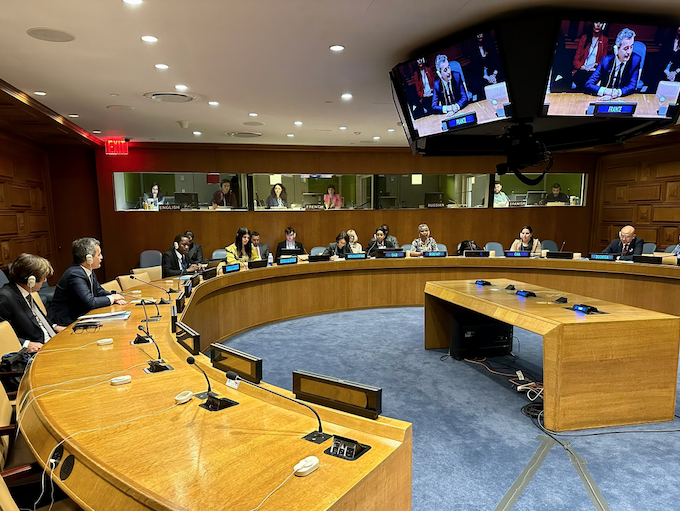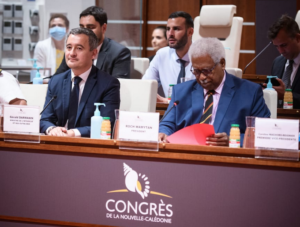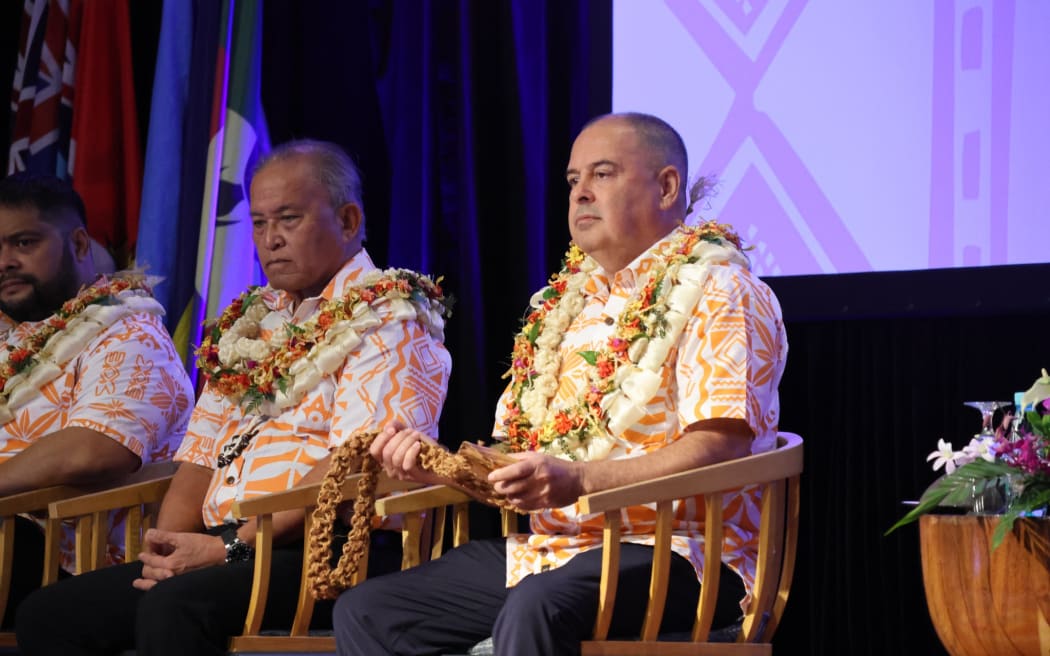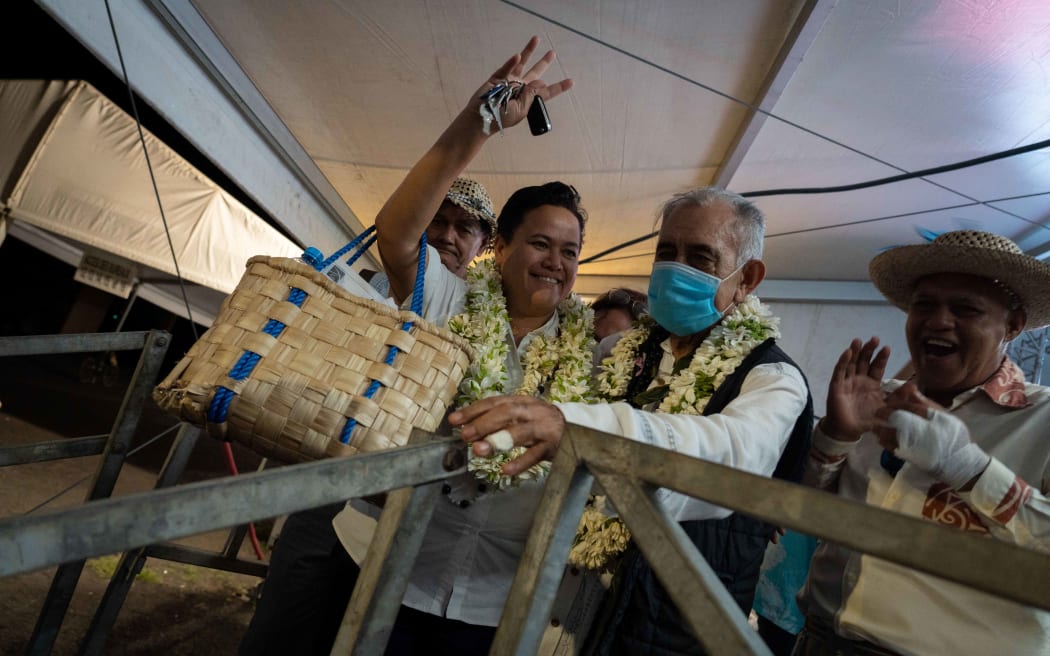
By Walter Zweifel, RNZ Pacific reporter
French Interior Minister Gérald Darmanin has invited the United Nations Decolonisation Committee members to visit New Caledonia.
Controlled by France since 1853, New Caledonia was returned to the UN decolonisation list as prolonged political violence threatened in 1986 — 39 years after France had withdrawn it and its other major Pacific colony from the 19th century, French Polynesia, from the list.
France says it has complied with the UN decolonisation process and regularly exchanged with the UN about New Caledonia.
During a visit to the United States last week, Darmanin stopped at the UN in New York to discuss the aftermath of the three referendums on independence which France organised in New Caledonia between 2018 and 2021.
Darmanin, who as Interior Minister is also responsible for France’s overseas possessions, said he had a constructive exchange, without elaborating.
He said, however, he wondered how “to trigger this right to self-determination on the scale of one or two generations”.
Darmanin also told the committee that after the referendums, France was trying to negotiate with both the pro- and anti-independence camps to formulate a future status for New Caledonia.
What next for New Caledonia?
The outcome of the referendum process as outlined in the 1998 Noumea Accord is in dispute, with the pro-independence parties claiming the rejection of independence is illegitimate because of the low turn-out of the colonised Kanak people in the last vote.

France had gone ahead with the third referendum despite a plea by pro-independence parties to postpone it because of the impact of the covid-19 pandemic on the Kanak population.
The pro-independence side refuses to recognise the result, saying that the referendum was not in the spirit of the 1998 Noumea Accord and the UN resolutions on the territory’s decolonisation.
It said the path of dialogue had been broken by the stubbornness of the French government, which was unable to reconcile its geostrategic interests in the Pacific with its obligation to decolonise New Caledonia.
The pro-independence camp has been lobbying for support to get the referendum outcome annulled.
However, a legal challenge in Paris last year by the customary Kanak Senate was unsuccessful while a further challenge of the referendum result filed with the International Court of Justice is pending.

New PIF chair taking ‘neutral’ position
This month, the Pacific Islands Forum said it would “not intrude” into New Caledonia’s affairs although a subgroup, the Melanesian Spearhead Group, had earlier backed calls for the UN to declare the result null and void.
Asked for the Forum’s view, its chair, Cook Islands Prime Minister Mark Brown, said the “Forum respects the due process of each country”.
“It is not the Forum’s role to intrude into the domestic matters of countries as they determine their independence or their dependence on other countries,” Brown said.
The pro-independence side has refused to engage with the anti-independence side in discussions about any new statute. Instead, it has insisted on having bilateral talks with only the French government on a timetable to conclude the decolonisation process and restore New Caledonia’s sovereignty.
In March, Darmanin visited New Caledonia for talks with a cross-section of society, and last month New Caledonia’s political leaders were in Paris for more discussions.
None of these meetings have yielded a consensus on a way forward.
Audition cet après-midi à l’@ONU_fr par le C24, comité des Nations Unies en charge des sujets de décolonisation, afin de faire le point sur la Nouvelle-Calédonie.
Merci à la présidente du comité et aux pays membres pour cet échange riche et constructif. Au nom du Gouvernement,… pic.twitter.com/Ya5BY1k9Kc— Gérald DARMANIN (@GDarmanin) May 19, 2023
Next week, Darmanin is due back in Noumea in a renewed effort to advance discussions on New Caledonia’s future status.
The anti-independence parties want Paris to honour the referendum result and move towards reintegration of New Caledonia into France by abolishing the restricted rolls created with the Noumea Accord.
The push received support last week from the deputy leader of France’s Republicans François Xavier Bellamy who visited Noumea.
He said his side would support changes to the French constitution to allow for the rolls to be opened up — a move firmly resisted by the pro-independence side.
French Polynesia marks 10th reinscription anniversary

The ruling pro-independence Tavini Huira’atira party in French Polynesia marked the 10th anniversary of the territory’s reinscription in Faa’a where the party founder and leader Oscar Temaru is mayor.
His decades-long campaign succeeded in 2013 when the UN General Assembly approved a resolution — sponsored by Solomon Islands — and re-inscribed French Polynesia on the world body’s decolonisation list.
The decision, which came in the dying days of the last government led by Temaru, was vehemently criticised by the Tahitian government, which succeeded his, as well as France, which labelled the UN decision an “interference”.
While France has refused to attend any UN discussion on French Polynesia, the pro-autonomy government of the past decade regularly sent delegates to the annual gathering in New York.
Marking the anniversary this year, Tavini’s youngest assembly member Tematai Le Gayic told Tahiti Nui TV he was disappointed that the “French state agrees to negotiate when there is bloodshed”, referring to New Caledonia’s unrest of the 1980s.
“But when it’s with respect of law and democracy, France denies the process,” he added.
The opposition Tapura’s Tepuaraurii Teriitahi said that it would be good “if France accepted once and for all, to avoid any controversy, that UN observers could come to French Polynesia”.
While viewing independence as a long-term goal, the newly elected President Moetai Brotherson has been critical of France shunning the UN process, having described it as a “bad look”.
At the event in Faa’a, Brotherson said they went to ask the UN “to give us the possibility of choice, with a neutral arbiter”.
He said it was then up to his party to awaken consciences so that an overwhelming majority would vote for independence, which he said was not an end in itself but an essential step to building a nation.
“We don’t want a 50 percent-plus-one-vote victory,” he said.
This article is republished under a community partnership agreement with RNZ.











































